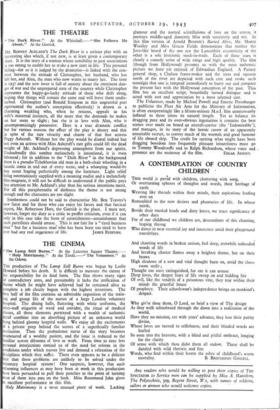THE
" The Dark River." At the Whitehall.—" She Follows Me About." At the Garrick.
MR. RODNEY ACKLAND'S The Dark River is a serious play with an interesting idea which, if not new, is at least given a contemporary slant. It is the story of a woman whose sensibility to past associations is too strong to enable her to make a new start in life. This personal failing—for so it is judged by the dramatist—is linked with the con- trast between the attitude of Christopher, her husband, who has left her, and Alan, the man who now wants to marry her. The time is 1937 and the new lover is full of anxiety about the imminent dan- ger of war and the unprepared state of the country while Christopher represents the happy-go-lucky attitude of those who drift along, hoping that things will remain the same and will leave them undis- turbed. Christopher (and Ronald Simpson in this ungrateful part represented the author's conception effectively) is drawn as a charming weakling who, when he returns, appeals to his wife's maternal instincts, all the more that the demands he makes on her seem so slight ; but she is in love with Alan, who is uncompromisingly possessive. Here is a true dramatic conflict but for various reasons the effect of the play is dreary and this in spite of the rare vivacity and charm of that fine actress Peggy Ashcroft. Without her the play would be dismal indeed but not even an actress with Miss Ashcroft's rare gifts could lift the dead weight of Mr. Ackland's depressing atmosphere from our spirits. Undoubtedly this sombre melancholy is intentional, it is even laboured ; for in addition to the " Dark River " in the background there is a pseudo-Tchekhovian old man in a bath-chair wheeling in a lunatic coma in and out of every scene, and a whooping would-be boy scout leaping pathetically among the furniture. Light relief being ostentatiously supplied with a moaning nudist and a melancholy film-magnate, it will not be difficult to understand if the public pays less attention to Mr. Ackland's play than his serious intentions merit. For all this paraphernalia of darkness the theme is not strong enough and the characters are too slight.
Sombreness could not be said to characterise Mr. Ben Travers's new farce and for those who can enjoy his farces and that farcical expert, Mr. Robertson Hare, the Garrick is the place. I must not, however, forget my duty as a critic to proffer criticism, even if it can only in this case take the form of astonishment—astonishment that such puerilities should amuse. This is not fate for a " tired business man " but for a business man who has been born too tired to have
ever had any real exgprience of life. JAMES REDFERN.


























 Previous page
Previous page